2004 PONTIAC BONNEVILLE lock
[x] Cancel search: lockPage 422 of 446
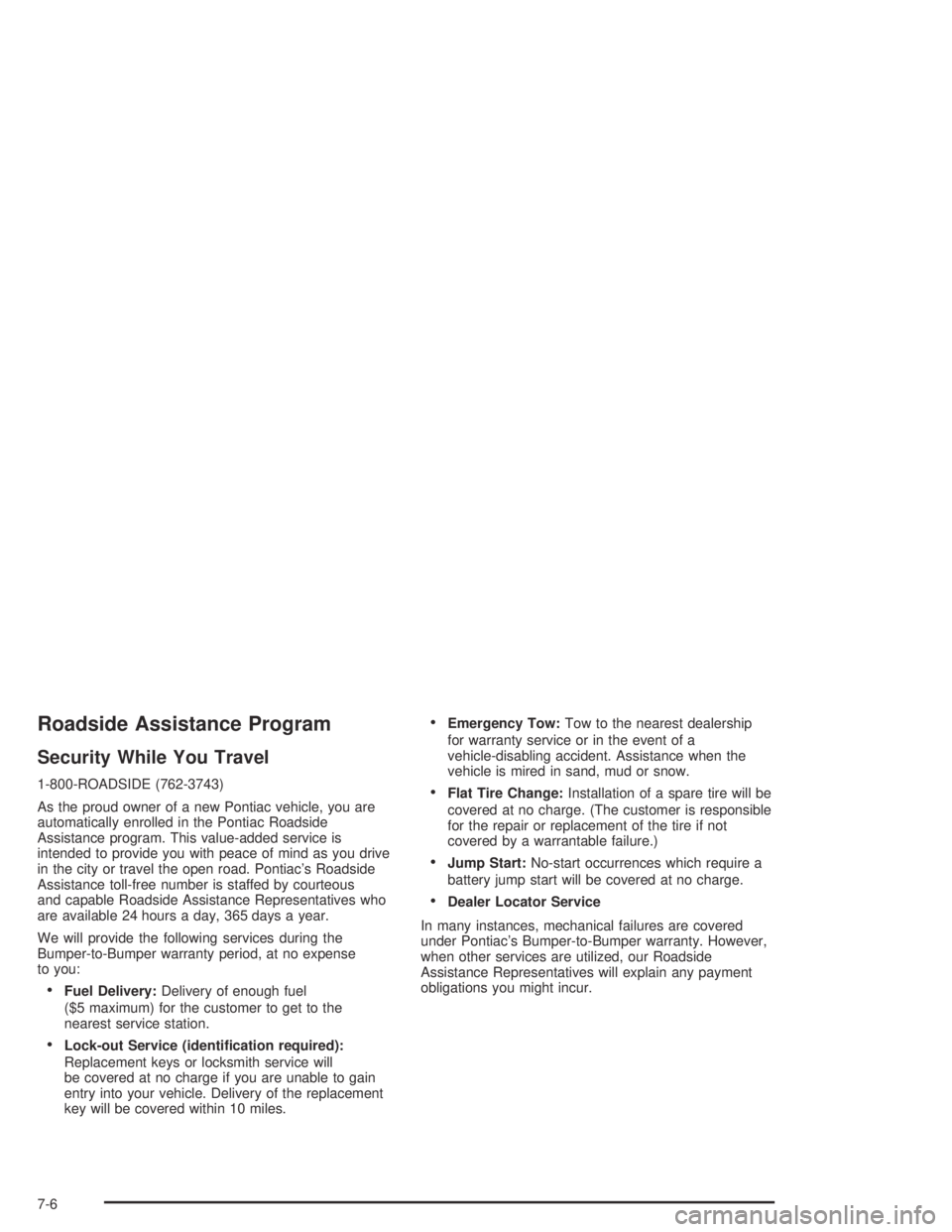
Roadside Assistance Program
Security While You Travel
1-800-ROADSIDE (762-3743)
As the proud owner of a new Pontiac vehicle, you are
automatically enrolled in the Pontiac Roadside
Assistance program. This value-added service is
intended to provide you with peace of mind as you drive
in the city or travel the open road. Pontiac’s Roadside
Assistance toll-free number is staffed by courteous
and capable Roadside Assistance Representatives who
are available 24 hours a day, 365 days a year.
We will provide the following services during the
Bumper-to-Bumper warranty period, at no expense
to you:
Fuel Delivery:Delivery of enough fuel
($5 maximum) for the customer to get to the
nearest service station.
Lock-out Service (identi�cation required):
Replacement keys or locksmith service will
be covered at no charge if you are unable to gain
entry into your vehicle. Delivery of the replacement
key will be covered within 10 miles.
Emergency Tow:Tow to the nearest dealership
for warranty service or in the event of a
vehicle-disabling accident. Assistance when the
vehicle is mired in sand, mud or snow.
Flat Tire Change:Installation of a spare tire will be
covered at no charge. (The customer is responsible
for the repair or replacement of the tire if not
covered by a warrantable failure.)
Jump Start:No-start occurrences which require a
battery jump start will be covered at no charge.
Dealer Locator Service
In many instances, mechanical failures are covered
under Pontiac’s Bumper-to-Bumper warranty. However,
when other services are utilized, our Roadside
Assistance Representatives will explain any payment
obligations you might incur.
7-6
Page 426 of 446
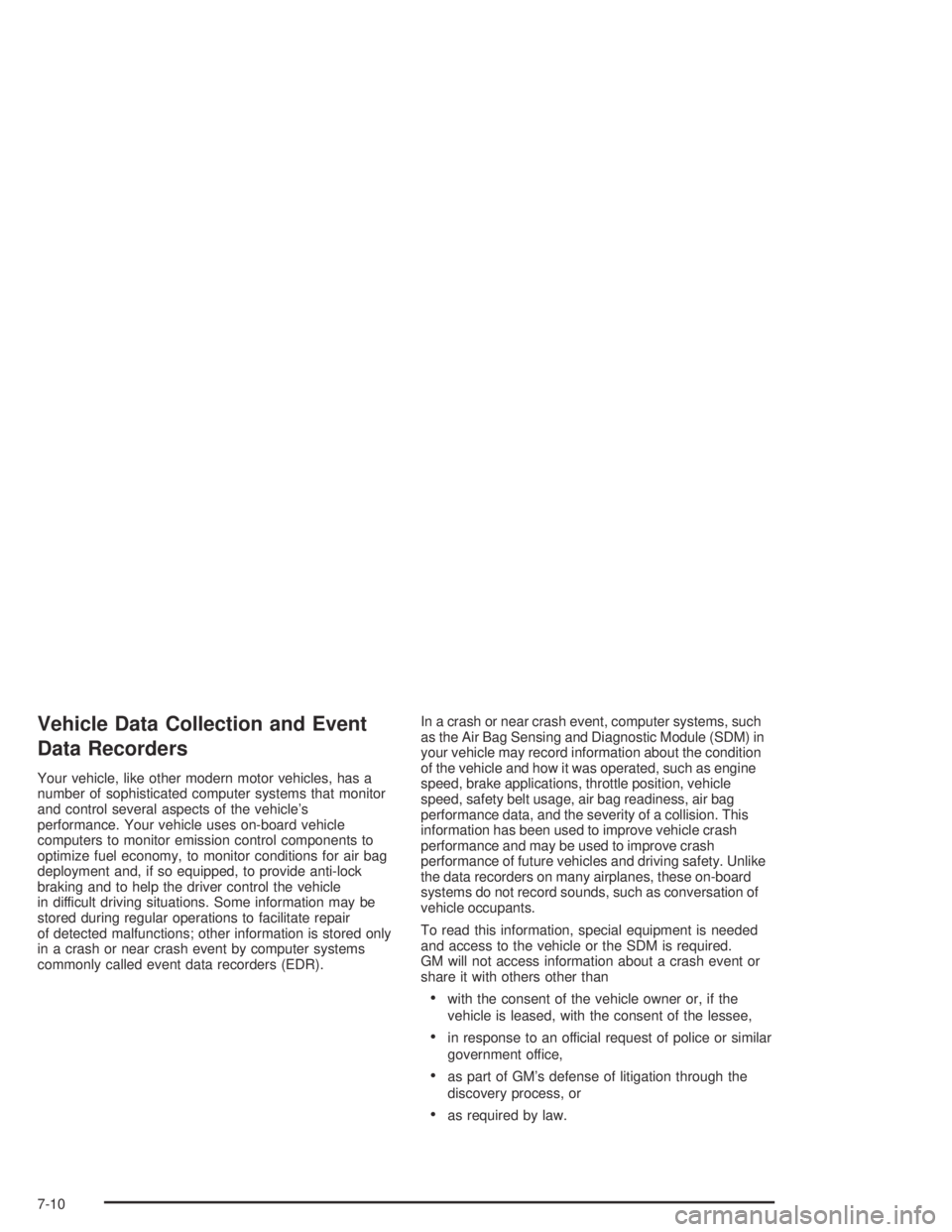
Vehicle Data Collection and Event
Data Recorders
Your vehicle, like other modern motor vehicles, has a
number of sophisticated computer systems that monitor
and control several aspects of the vehicle’s
performance. Your vehicle uses on-board vehicle
computers to monitor emission control components to
optimize fuel economy, to monitor conditions for air bag
deployment and, if so equipped, to provide anti-lock
braking and to help the driver control the vehicle
in difficult driving situations. Some information may be
stored during regular operations to facilitate repair
of detected malfunctions; other information is stored only
in a crash or near crash event by computer systems
commonly called event data recorders (EDR).In a crash or near crash event, computer systems, such
as the Air Bag Sensing and Diagnostic Module (SDM) in
your vehicle may record information about the condition
of the vehicle and how it was operated, such as engine
speed, brake applications, throttle position, vehicle
speed, safety belt usage, air bag readiness, air bag
performance data, and the severity of a collision. This
information has been used to improve vehicle crash
performance and may be used to improve crash
performance of future vehicles and driving safety. Unlike
the data recorders on many airplanes, these on-board
systems do not record sounds, such as conversation of
vehicle occupants.
To read this information, special equipment is needed
and access to the vehicle or the SDM is required.
GM will not access information about a crash event or
share it with others other than
with the consent of the vehicle owner or, if the
vehicle is leased, with the consent of the lessee,
in response to an official request of police or similar
government office,
as part of GM’s defense of litigation through the
discovery process, or
as required by law.
7-10
Page 431 of 446
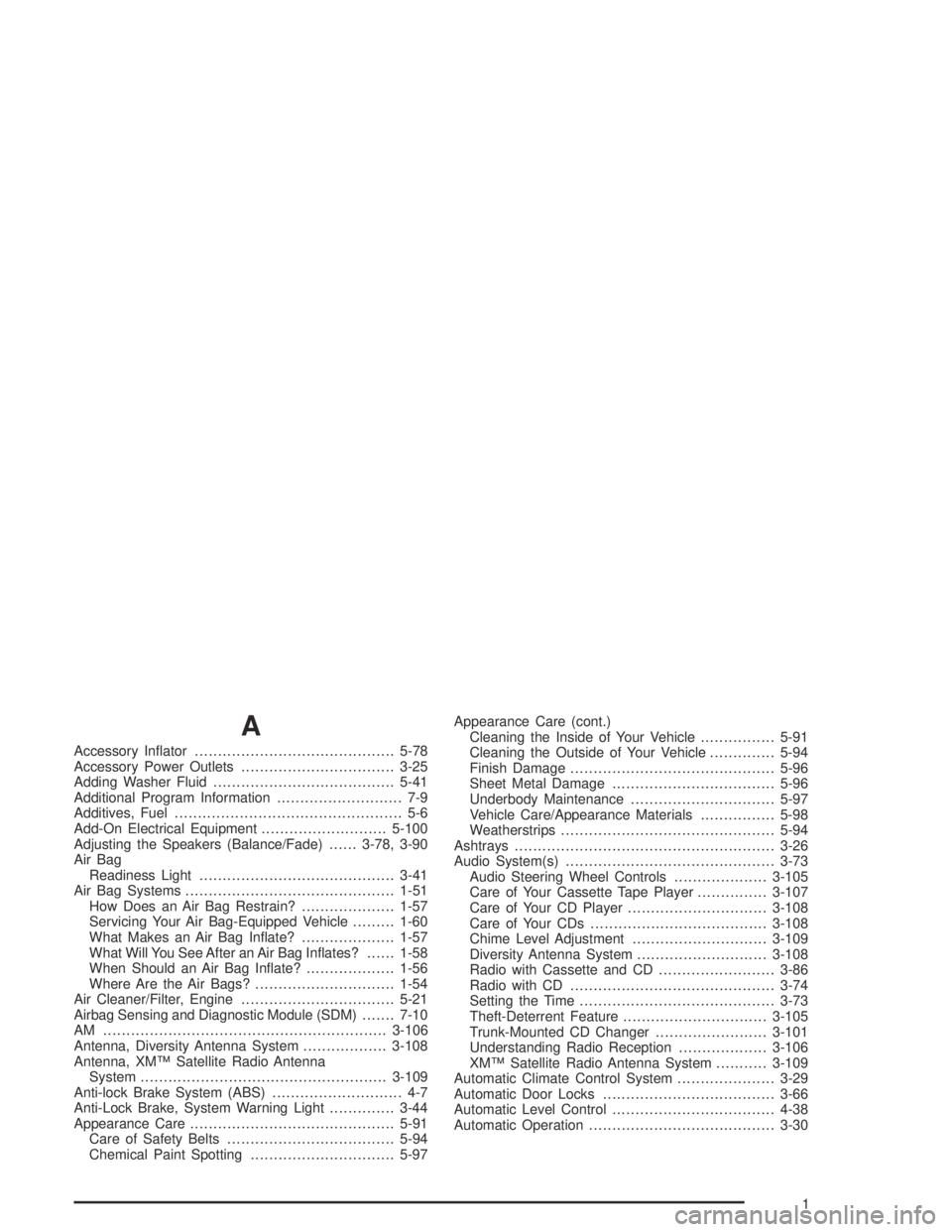
A
Accessory In�ator...........................................5-78
Accessory Power Outlets.................................3-25
Adding Washer Fluid.......................................5-41
Additional Program Information........................... 7-9
Additives, Fuel................................................. 5-6
Add-On Electrical Equipment...........................5-100
Adjusting the Speakers (Balance/Fade)......3-78, 3-90
Air Bag
Readiness Light..........................................3-41
Air Bag Systems.............................................1-51
How Does an Air Bag Restrain?....................1-57
Servicing Your Air Bag-Equipped Vehicle.........1-60
What Makes an Air Bag In�ate?....................1-57
What Will You See After an Air Bag In�ates?......1-58
When Should an Air Bag In�ate?...................1-56
Where Are the Air Bags?..............................1-54
Air Cleaner/Filter, Engine.................................5-21
Airbag Sensing and Diagnostic Module (SDM).......7-10
AM .............................................................3-106
Antenna, Diversity Antenna System..................3-108
Antenna, XM™ Satellite Radio Antenna
System.....................................................3-109
Anti-lock Brake System (ABS)............................ 4-7
Anti-Lock Brake, System Warning Light..............3-44
Appearance Care............................................5-91
Care of Safety Belts....................................5-94
Chemical Paint Spotting...............................5-97Appearance Care (cont.)
Cleaning the Inside of Your Vehicle................5-91
Cleaning the Outside of Your Vehicle..............5-94
Finish Damage............................................5-96
Sheet Metal Damage...................................5-96
Underbody Maintenance...............................5-97
Vehicle Care/Appearance Materials................5-98
Weatherstrips..............................................5-94
Ashtrays........................................................3-26
Audio System(s).............................................3-73
Audio Steering Wheel Controls....................3-105
Care of Your Cassette Tape Player...............3-107
Care of Your CD Player..............................3-108
Care of Your CDs......................................3-108
Chime Level Adjustment.............................3-109
Diversity Antenna System............................3-108
Radio with Cassette and CD.........................3-86
Radio with CD............................................3-74
Setting the Time..........................................3-73
Theft-Deterrent Feature...............................3-105
Trunk-Mounted CD Changer........................3-101
Understanding Radio Reception...................3-106
XM™ Satellite Radio Antenna System...........3-109
Automatic Climate Control System.....................3-29
Automatic Door Locks.....................................3-66
Automatic Level Control...................................4-38
Automatic Operation........................................3-30
1
Page 432 of 446
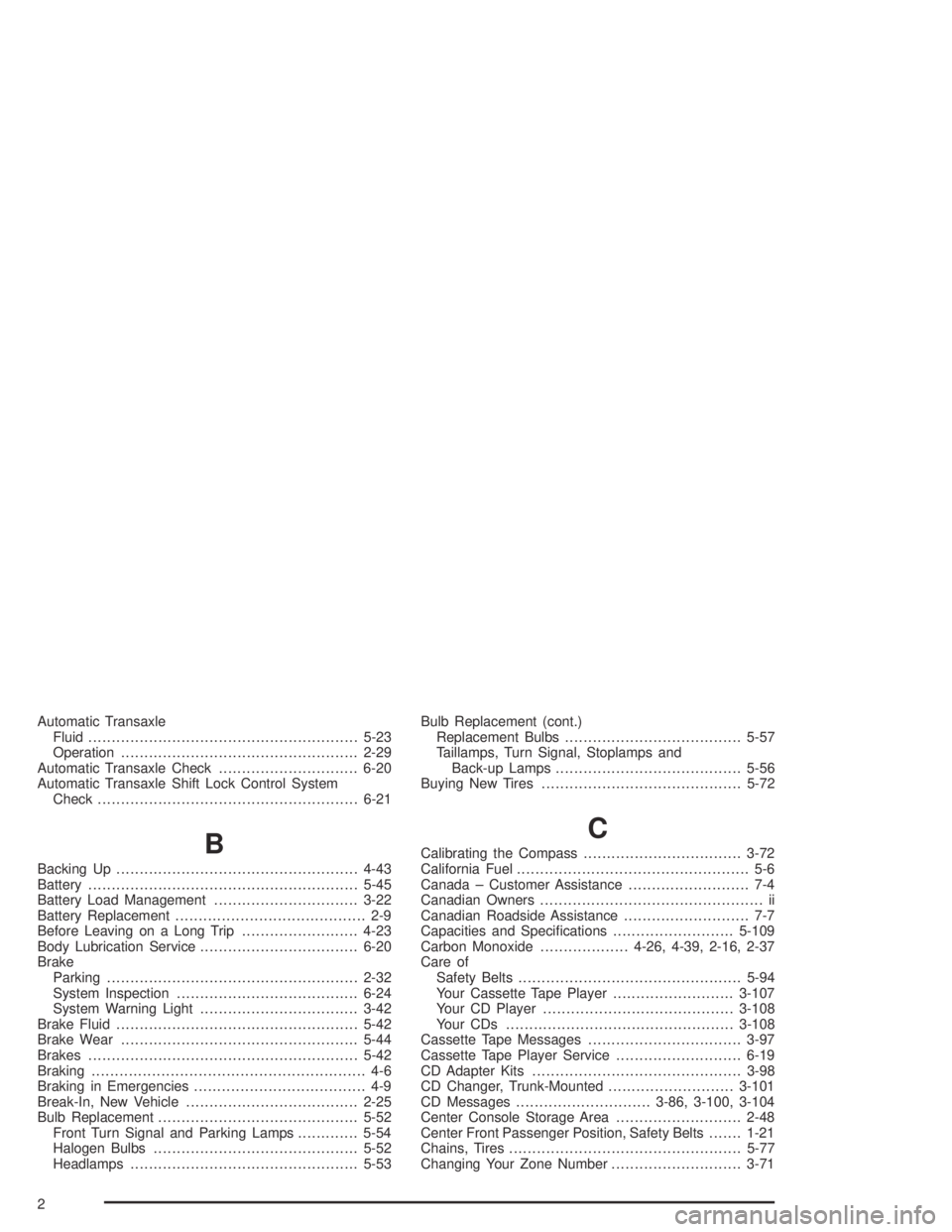
Automatic Transaxle
Fluid..........................................................5-23
Operation...................................................2-29
Automatic Transaxle Check..............................6-20
Automatic Transaxle Shift Lock Control System
Check........................................................6-21
B
Backing Up....................................................4-43
Battery..........................................................5-45
Battery Load Management...............................3-22
Battery Replacement......................................... 2-9
Before Leaving on a Long Trip.........................4-23
Body Lubrication Service..................................6-20
Brake
Parking......................................................2-32
System Inspection.......................................6-24
System Warning Light..................................3-42
Brake Fluid....................................................5-42
Brake Wear...................................................5-44
Brakes..........................................................5-42
Braking........................................................... 4-6
Braking in Emergencies..................................... 4-9
Break-In, New Vehicle.....................................2-25
Bulb Replacement...........................................5-52
Front Turn Signal and Parking Lamps.............5-54
Halogen Bulbs............................................5-52
Headlamps.................................................5-53Bulb Replacement (cont.)
Replacement Bulbs......................................5-57
Taillamps, Turn Signal, Stoplamps and
Back-up Lamps........................................5-56
Buying New Tires...........................................5-72
C
Calibrating the Compass..................................3-72
California Fuel.................................................. 5-6
Canada – Customer Assistance.......................... 7-4
Canadian Owners................................................ ii
Canadian Roadside Assistance........................... 7-7
Capacities and Speci�cations..........................5-109
Carbon Monoxide...................4-26, 4-39, 2-16, 2-37
Care of
Safety Belts................................................5-94
Your Cassette Tape Player..........................3-107
Your CD Player.........................................3-108
Your CDs .................................................3-108
Cassette Tape Messages.................................3-97
Cassette Tape Player Service...........................6-19
CD Adapter Kits.............................................3-98
CD Changer, Trunk-Mounted...........................3-101
CD Messages.............................3-86, 3-100, 3-104
Center Console Storage Area...........................2-48
Center Front Passenger Position, Safety Belts.......1-21
Chains, Tires..................................................5-77
Changing Your Zone Number............................3-71
2
Page 434 of 446
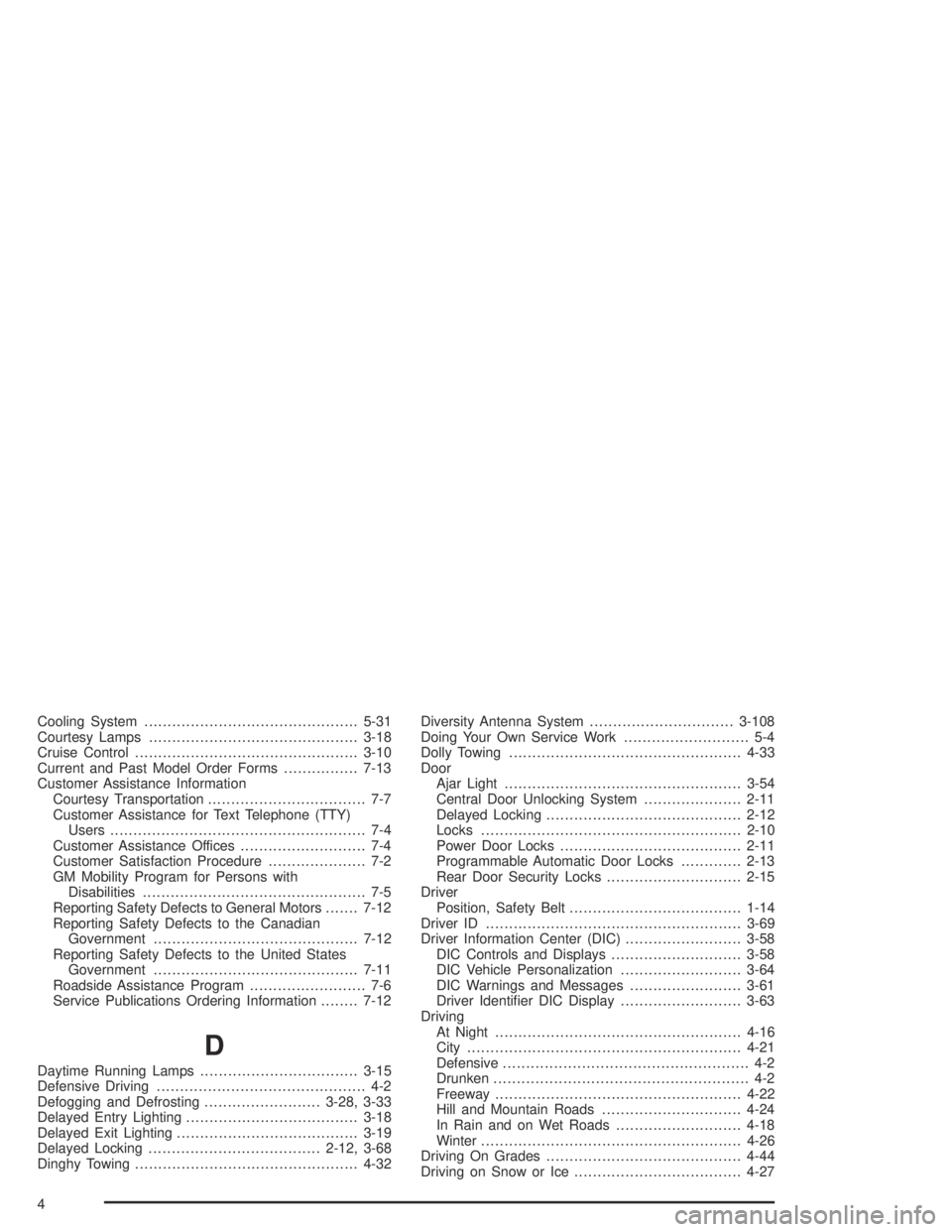
Cooling System..............................................5-31
Courtesy Lamps.............................................3-18
Cruise Control................................................3-10
Current and Past Model Order Forms................7-13
Customer Assistance Information
Courtesy Transportation.................................. 7-7
Customer Assistance for Text Telephone (TTY)
Users....................................................... 7-4
Customer Assistance Offices........................... 7-4
Customer Satisfaction Procedure..................... 7-2
GM Mobility Program for Persons with
Disabilities................................................ 7-5
Reporting Safety Defects to General Motors.......7-12
Reporting Safety Defects to the Canadian
Government............................................7-12
Reporting Safety Defects to the United States
Government............................................7-11
Roadside Assistance Program......................... 7-6
Service Publications Ordering Information........7-12
D
Daytime Running Lamps..................................3-15
Defensive Driving............................................. 4-2
Defogging and Defrosting.........................3-28, 3-33
Delayed Entry Lighting.....................................3-18
Delayed Exit Lighting.......................................3-19
Delayed Locking.....................................2-12, 3-68
Dinghy Towing................................................4-32Diversity Antenna System...............................3-108
Doing Your Own Service Work........................... 5-4
Dolly Towing..................................................4-33
Door
Ajar Light...................................................3-54
Central Door Unlocking System.....................2-11
Delayed Locking..........................................2-12
Locks........................................................2-10
Power Door Locks.......................................2-11
Programmable Automatic Door Locks.............2-13
Rear Door Security Locks.............................2-15
Driver
Position, Safety Belt.....................................1-14
Driver ID.......................................................3-69
Driver Information Center (DIC).........................3-58
DIC Controls and Displays............................3-58
DIC Vehicle Personalization..........................3-64
DIC Warnings and Messages........................3-61
Driver Identi�er DIC Display..........................3-63
Driving
At Night.....................................................4-16
City...........................................................4-21
Defensive..................................................... 4-2
Drunken....................................................... 4-2
Freeway.....................................................4-22
Hill and Mountain Roads..............................4-24
In Rain and on Wet Roads...........................4-18
Winter........................................................4-26
Driving On Grades..........................................4-44
Driving on Snow or Ice....................................4-27
4
Page 435 of 446
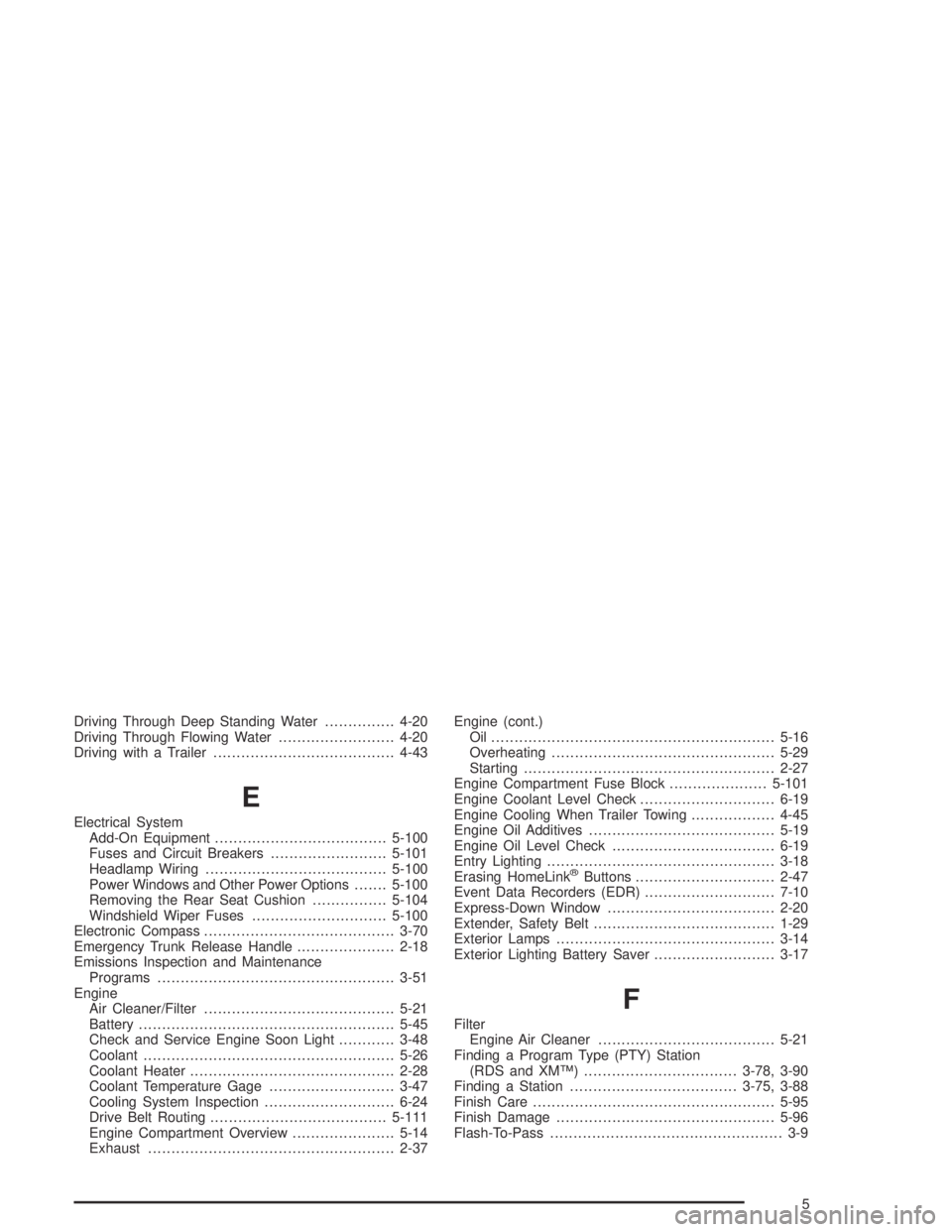
Driving Through Deep Standing Water...............4-20
Driving Through Flowing Water.........................4-20
Driving with a Trailer.......................................4-43
E
Electrical System
Add-On Equipment.....................................5-100
Fuses and Circuit Breakers.........................5-101
Headlamp Wiring.......................................5-100
Power Windows and Other Power Options.......5-100
Removing the Rear Seat Cushion................5-104
Windshield Wiper Fuses.............................5-100
Electronic Compass.........................................3-70
Emergency Trunk Release Handle.....................2-18
Emissions Inspection and Maintenance
Programs...................................................3-51
Engine
Air Cleaner/Filter.........................................5-21
Battery.......................................................5-45
Check and Service Engine Soon Light............3-48
Coolant......................................................5-26
Coolant Heater............................................2-28
Coolant Temperature Gage...........................3-47
Cooling System Inspection............................6-24
Drive Belt Routing......................................5-111
Engine Compartment Overview......................5-14
Exhaust.....................................................2-37Engine (cont.)
Oil .............................................................5-16
Overheating................................................5-29
Starting......................................................2-27
Engine Compartment Fuse Block.....................5-101
Engine Coolant Level Check.............................6-19
Engine Cooling When Trailer Towing..................4-45
Engine Oil Additives........................................5-19
Engine Oil Level Check...................................6-19
Entry Lighting.................................................3-18
Erasing HomeLink
®Buttons..............................2-47
Event Data Recorders (EDR)............................7-10
Express-Down Window....................................2-20
Extender, Safety Belt.......................................1-29
Exterior Lamps...............................................3-14
Exterior Lighting Battery Saver..........................3-17
F
Filter
Engine Air Cleaner......................................5-21
Finding a Program Type (PTY) Station
(RDS and XM™).................................3-78, 3-90
Finding a Station....................................3-75, 3-88
Finish Care....................................................5-95
Finish Damage...............................................5-96
Flash-To-Pass.................................................. 3-9
5
Page 437 of 446
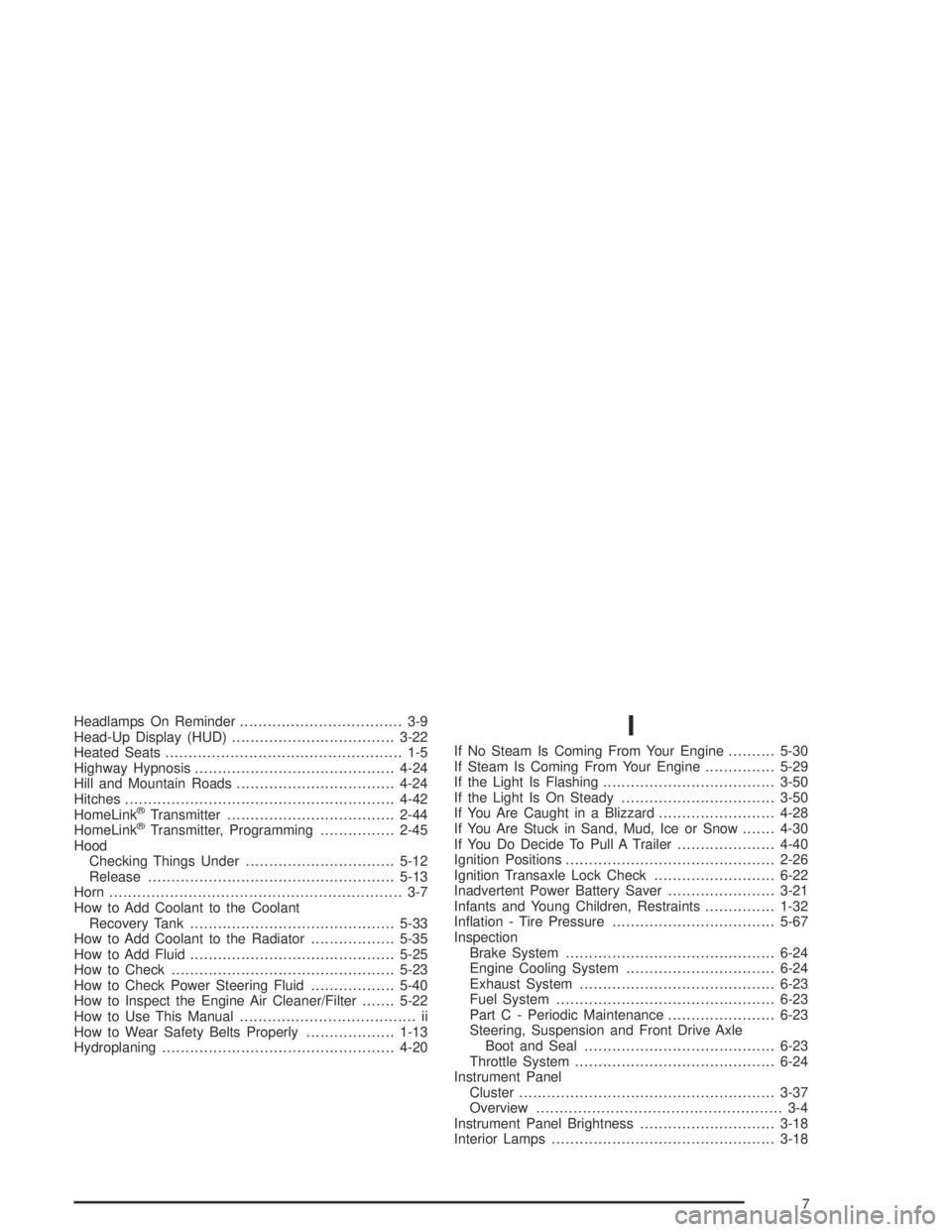
Headlamps On Reminder................................... 3-9
Head-Up Display (HUD)...................................3-22
Heated Seats................................................... 1-5
Highway Hypnosis...........................................4-24
Hill and Mountain Roads..................................4-24
Hitches..........................................................4-42
HomeLink
®Transmitter....................................2-44
HomeLink®Transmitter, Programming................2-45
Hood
Checking Things Under................................5-12
Release.....................................................5-13
Horn............................................................... 3-7
How to Add Coolant to the Coolant
Recovery Tank............................................5-33
How to Add Coolant to the Radiator..................5-35
How to Add Fluid............................................5-25
How to Check................................................5-23
How to Check Power Steering Fluid..................5-40
How to Inspect the Engine Air Cleaner/Filter.......5-22
How to Use This Manual...................................... ii
How to Wear Safety Belts Properly...................1-13
Hydroplaning..................................................4-20
I
If No Steam Is Coming From Your Engine..........5-30
If Steam Is Coming From Your Engine...............5-29
If the Light Is Flashing.....................................3-50
If the Light Is On Steady.................................3-50
If You Are Caught in a Blizzard.........................4-28
If You Are Stuck in Sand, Mud, Ice or Snow.......4-30
If You Do Decide To Pull A Trailer.....................4-40
Ignition Positions.............................................2-26
Ignition Transaxle Lock Check..........................6-22
Inadvertent Power Battery Saver.......................3-21
Infants and Young Children, Restraints...............1-32
In�ation - Tire Pressure...................................5-67
Inspection
Brake System.............................................6-24
Engine Cooling System................................6-24
Exhaust System..........................................6-23
Fuel System...............................................6-23
Part C - Periodic Maintenance.......................6-23
Steering, Suspension and Front Drive Axle
Boot and Seal.........................................6-23
Throttle System...........................................6-24
Instrument Panel
Cluster.......................................................3-37
Overview..................................................... 3-4
Instrument Panel Brightness.............................3-18
Interior Lamps................................................3-18
7
Page 438 of 446
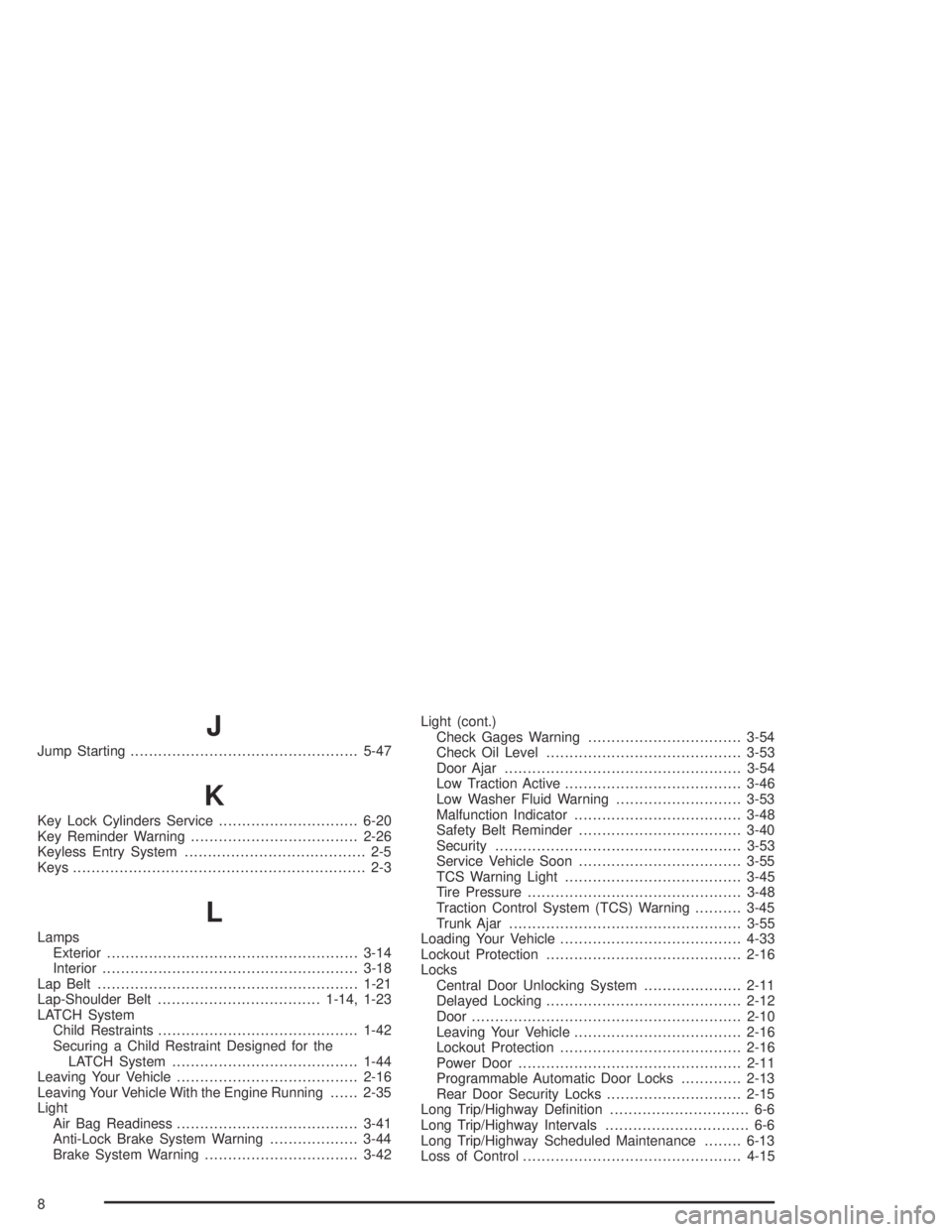
J
Jump Starting.................................................5-47
K
Key Lock Cylinders Service..............................6-20
Key Reminder Warning....................................2-26
Keyless Entry System....................................... 2-5
Keys............................................................... 2-3
L
Lamps
Exterior......................................................3-14
Interior.......................................................3-18
Lap Belt........................................................1-21
Lap-Shoulder Belt...................................1-14, 1-23
LATCH System
Child Restraints...........................................1-42
Securing a Child Restraint Designed for the
LATCH System........................................1-44
Leaving Your Vehicle.......................................2-16
Leaving Your Vehicle With the Engine Running......2-35
Light
Air Bag Readiness.......................................3-41
Anti-Lock Brake System Warning...................3-44
Brake System Warning.................................3-42Light (cont.)
Check Gages Warning.................................3-54
Check Oil Level..........................................3-53
Door Ajar...................................................3-54
Low Traction Active......................................3-46
Low Washer Fluid Warning...........................3-53
Malfunction Indicator....................................3-48
Safety Belt Reminder...................................3-40
Security.....................................................3-53
Service Vehicle Soon...................................3-55
TCS Warning Light......................................3-45
Tire Pressure..............................................3-48
Traction Control System (TCS) Warning..........3-45
Trunk Ajar..................................................3-55
Loading Your Vehicle.......................................4-33
Lockout Protection..........................................2-16
Locks
Central Door Unlocking System.....................2-11
Delayed Locking..........................................2-12
Door..........................................................2-10
Leaving Your Vehicle....................................2-16
Lockout Protection.......................................2-16
Power Door................................................2-11
Programmable Automatic Door Locks.............2-13
Rear Door Security Locks.............................2-15
Long Trip/Highway De�nition.............................. 6-6
Long Trip/Highway Intervals............................... 6-6
Long Trip/Highway Scheduled Maintenance........6-13
Loss of Control...............................................4-15
8